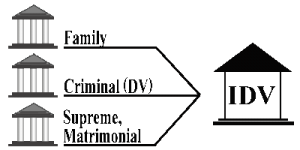Even more stressful than having a case in DV is having a criminal and a family law case in the Integrated Domestic Violence Parts (IDV) of New York State. This is because the Defendant has a criminal law case and a family law case in front of the same Judge, and one Judge hears both cases generally.
The New York State Court system describes IDV as:
“Integrated Domestic Violence (“IDV”) courts use a “one family-one judge” model to bring before a single judge the multiple criminal, family (civil) and matrimonial (divorce) disputes for families where domestic violence is an underlying issue. Prior to the creation of IDV courts in New York State, these case types were heard in separate courts before a number of judges, often in different buildings or parts of a county. As a result, those affected by domestic violence were left to navigate a complicated court structure. Having their cases handled in this way cost them time and money, led to confusion and jeopardized their safety.
The IDV courts are a response to these challenges. IDV courts aim to ensure consistency and enhance services to victims and families. IDV courts are staffed with judges trained in multiple areas of law and the dynamics of domestic violence. They incorporate ongoing judicial monitoring of offenders. Through coordination with victim advocates and a network of services and outside agencies, IDV courts reduce burdens on victims and families and also improve information flow to both litigants and service providers.
IDV courts are established in Supreme Court. To be eligible for IDV court, a family must have a criminal domestic violence case as well as a family court case, a matrimonial case, or both, where at least one of the defendant and complaining witness to the criminal case is also a party to the family or matrimonial case. The most common family court case types in IDV court are family offense and custody or visitation, which account for about 85% of family cases in IDV court; some IDV courts also take support, abuse and neglect, or paternity cases. Misdemeanors represent the bulk of criminal cases in IDV court, though IDV courts may take felony-level criminal cases as well as misdemeanors and violations.

Litigants may not choose to go to IDV court or stay out of it. The judge presiding in the IDV court reviews potentially eligible cases and determines whether transfer would promote the administration of justice based on Part 141 of the Rules of the Chief Administrator, the statewide IDV court model and the facts of the particular cases. If the IDV judge transfers the cases, they all become Supreme Court cases; however, the cases do not merge and are handled separately based on the evidence in the case. IDV courts apply to each case the substantive and procedural law that would have applied in the case’s court of origin. Under this structure, a family’s multiple cases come before one judge. Having a single judge adjudicate multiple cases ensures consistency in judicial orders and allows the court to better respond to the particularities of a family’s situation. IDV courts incorporate judicial monitoring; facilitate access to advocacy and services, and place emphasis on close communication with outside agencies and programs.”
It’s important for litigants to remember that when they are involved in IDV they are involved in two cases. The person who has cases in IDV must have a DEDICATED ATTORNEY willing to handle both cases. Each case may have an effect on the other. The attorney must be skillful and willing to fight for his client.
If you have a case please contact me immediately.
Walter L. Fields Attorney at Law:
Dedicated to protecting his client’s rights.
In the five counties of New York City, Judges that oversee the IDV parts are:
| Bronx | Kings | New York | Queens | Richmond | Westchester |
Hon. Diane Kiesel
|
|||||

